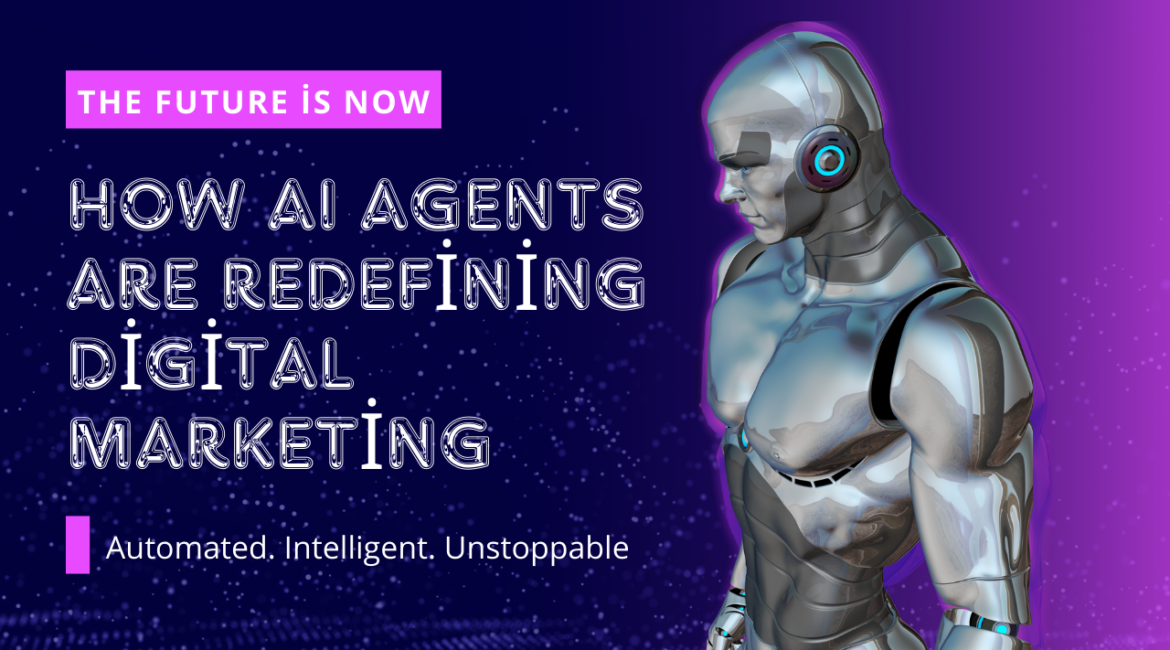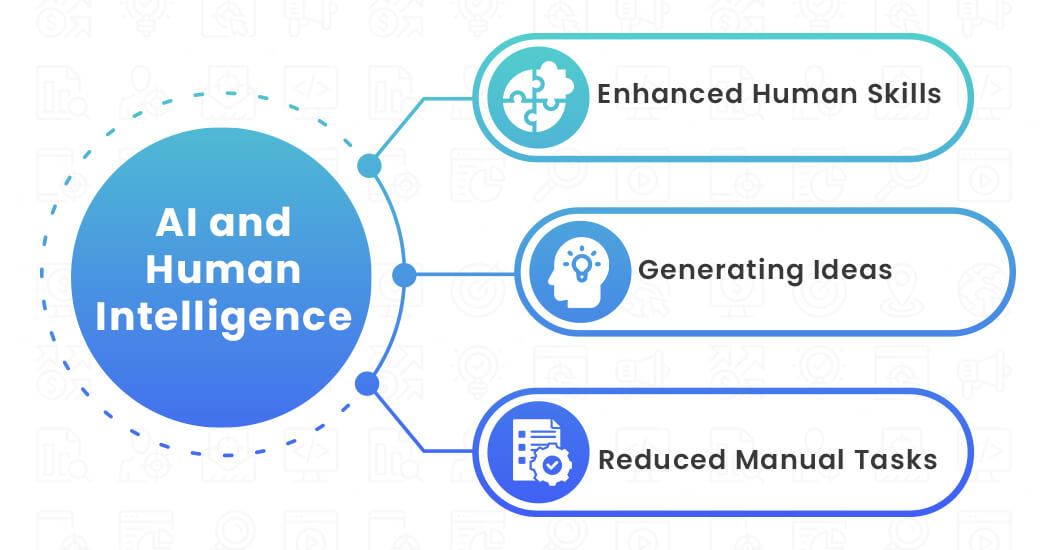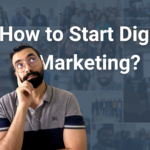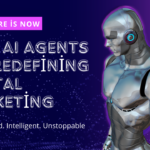Imagine being able to free up a significant portion of your marketing team’s time while simultaneously boosting campaign performance. This isn’t just a futuristic idea—it’s already a reality for businesses that have adopted AI for digital marketing. While traditional marketing automation has long helped streamline workflows, AI agents take innovation to a new level. These autonomous systems don’t just execute commands—they make smart decisions, act independently, and keep optimizing without constant human supervision. In this guide, we’ll dive into what AI agents are, how they’re revolutionizing AI for digital marketing, and how you can begin using them to elevate your business.

What are AI agents?
really grasp how AI is changing the game in digital marketing, it’s crucial to see how it stands apart from older technologies.
Take a standard software application, for example. It only performs specific tasks when you tell it to. Think about a calculator—it processes exactly what you enter and nothing more.
Now, marketing automation tools take this a step further by executing pre-set workflows based on user actions. For example, “When someone signs up, send email A after two days; if they click, send B, otherwise send C.” These tools follow strict paths and don’t offer much in the way of flexibility.
Basic AI solutions can spot trends or create content by analyzing data patterns they’ve learned. But they still rely on humans to steer each specific action. A writing tool might whip up email content, but it won’t figure out the best time to send it or who the ideal audience is.
By contrast, AI agents operate on their own with a clear purpose. They keep an eye on their environment, set goals, make decisions independently, take action across different platforms, and learn from their experiences.
In practical terms, an AI agent does more than just help with tasks—it actively contributes to strategy and performance. It feels less like a tool and more like a genuine team member.
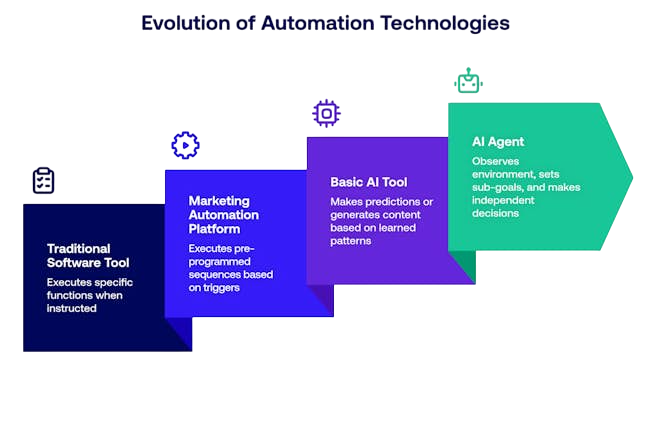
How do AI agents work?
At the heart of AI for digital marketing is a new kind of teammate: the AI agent. These agents are powered by a smart mix of technologies working together seamlessly. Their core intelligence—often driven by advanced models like Chat GPT or Claude—gives them the ability to think, reason, and make decisions. They’re connected directly to your marketing tools—email platforms, ad systems, CRMs, and analytics—via APIs, so they can take meaningful action across channels.
What sets AI agents apart from traditional tools is their ability to remember and learn. They don’t just follow instructions—they improve over time by learning from what has and hasn’t worked. And they’re guided by clear rules and goals you define, like staying within your ad budget, keeping brand messaging consistent, or hitting specific campaign targets.
Here’s the key: the AI doesn’t operate on its own agenda. Your team sets the boundaries. You decide how far it can go, what it should prioritize, and what guardrails to follow—ensuring it supports your brand’s unique voice and objectives.
For instance, you might restrict your AI ad agent from exceeding certain bid limits, or require human review before any campaign goes live. These customizations keep the AI aligned with your marketing strategy—not just chasing quick wins.
And finally, not every AI tool is built the same. It’s important to understand the difference between AI chatbots, AI assistants, and AI agents—especially if you’re serious about making the most of AI for digital marketing.
AI chatbots, AI assistants, and AI agents

When exploring AI for digital marketing, it’s important to understand that not all AI tools are created equal. Let’s break down the differences between three types: AI chatbots, AI assistants, and AI agents.
AI Chatbots
These are the most basic. You’ve probably seen them on websites answering FAQs or guiding you through simple steps. They follow a scripted path—responding only to specific inputs with pre-written replies. While helpful for basic customer support, they can’t really think or adapt on their own.
AI Assistants
Next up are AI assistants—like early versions of Chat GPT. These are more flexible. They can create content, answer open-ended questions, and offer suggestions based on your input. But their abilities are still limited to the chat window. They don’t take actions outside of the conversation, and they’re not connected to your marketing platforms or workflows.
AI Agents
Now here’s where AI for digital marketing gets truly exciting. AI agents go far beyond just chatting—they think, act, and improve over time. These agents connect with your marketing tools—like email platforms, ad systems, or CRMs—and take real actions based on live data.
They don’t just wait for instructions. They identify patterns, make decisions, and act proactively. For example, imagine an AI agent managing engagement for a seasonal email campaign:
-
It tracks open and click rates across customer groups.
-
Notices that previously active customers are disengaging.
-
Launches a re-engagement campaign—completely on its own.
-
Writes personalized content using past purchase data.
-
Sends emails at the best times for each user segment.
-
Monitors the results, learns from what works, and adjusts automatically.
And the best part? Your team only gave it the high-level goal: “Keep engagement up.” The agent figured out the how.
From Tools to Teammates: The “Cybernetic Team Mate” Idea
Here’s a game-changing insight from recent research by Harvard and P&G: AI agents don’t just act like smart tools—they behave more like teammates.
A regular tool helps you do something, but it still needs you to steer every step. A cybernetic teammate, on the other hand, senses what’s going on, makes decisions, and works alongside humans toward shared goals. This is a big shift in how we think about technology in our teams.
The research even found that individuals working with AI performed as well as entire human teams working without it. That means an AI agent can offer the kind of collaboration and expertise we typically expect from colleagues. Even better, AI helped people step outside their normal job boundaries—marketers became more technical, and tech specialists started thinking more commercially.
For marketing teams—especially those struggling with knowledge silos—this opens up huge potential. With the right use of AI for digital marketing, you’re not just automating tasks. You’re expanding the capability and creativity of your entire team.
How to use AI agents for digital marketing
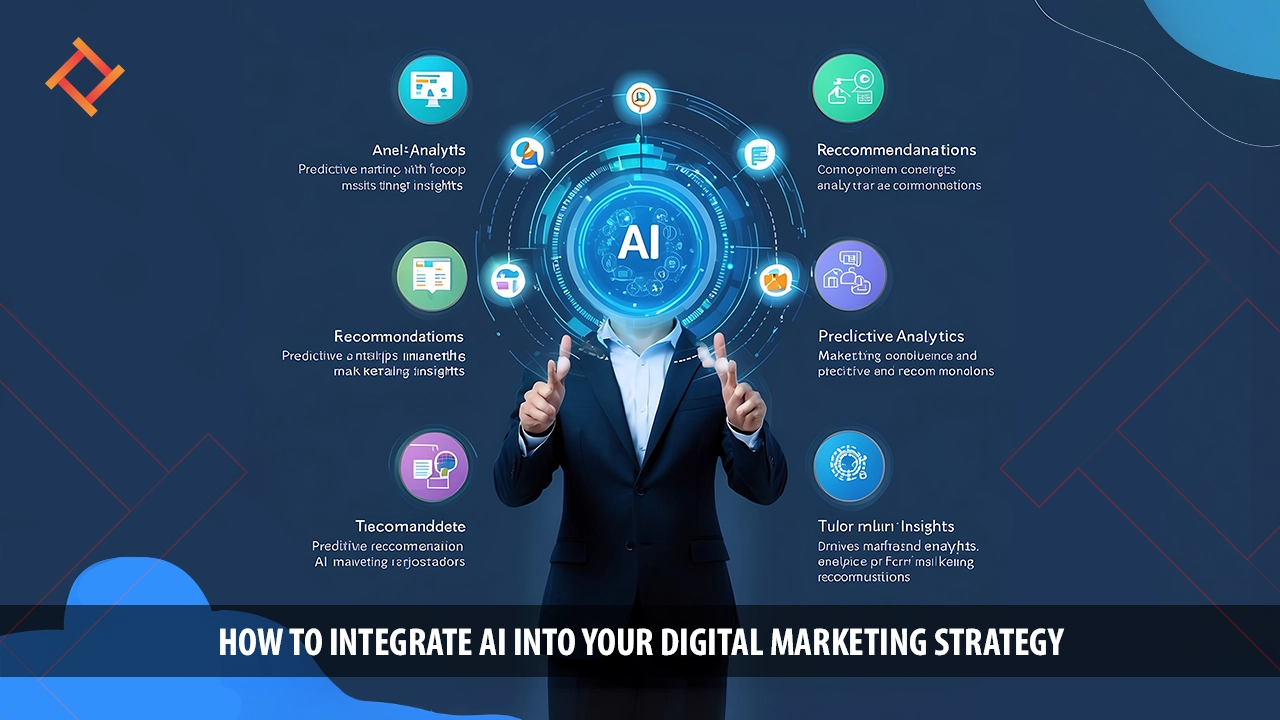
In the traditional world of marketing, everything moves in cycles: plan, execute, measure, adjust—then start all over again. This reactive process often creates delays between spotting an opportunity and actually doing something about it. But with the rise of AI for digital marketing, that cycle is getting a serious upgrade.
Instead of waiting for a weekly or monthly performance review to make changes, AI agents are always watching, always optimizing. Take paid advertising, for example. A typical marketing team might sit down every Friday to review campaign data and make changes based on what happened over the last week.
An AI agent doesn’t wait. It monitors performance in real time—catching trends as they unfold. If one version of an ad starts performing better than the rest, the AI immediately shifts more budget toward it. If conversions start to dip, it can dig into the data, figure out why, and make adjustments instantly. No more waiting around for the next team meeting.
You capture opportunities as they happen
You solve problems before they snowball
You spend your budget where it matters most
This is where AI for digital marketing shines—keeping your efforts agile, efficient, and always on point.
A New Team Dynamic: Humans + AI
As AI agents handle more of the daily execution, marketing teams are finding a better balance between human creativity and machine efficiency.
Humans bring the heart—empathy, big-picture strategy, storytelling, and ethical thinking.
AI brings the horsepower—data crunching, pattern recognition, and consistent, real-time execution across channels.
So instead of spending time on tedious tasks, human marketers can focus on what they do best: building relationships, developing bold ideas, guiding brand voice, and ensuring marketing efforts align with company values.
Meanwhile, AI for digital marketing handles the behind-the-scenes work: running campaigns, analyzing performance, personalizing messages, and optimizing spend—automatically and intelligently.
The result? A smarter, faster, and more human marketing team—with AI agents as your most reliable digital teammates.
The Economic Power of AI for Digital Marketing
Why AI isn’t just a tool—it’s your smartest investment yet.
In the past, marketing budgets were often viewed as necessary costs—something to defend, trim, or justify. But times have changed.
With AI for digital marketing, your budget transforms from a line item into a growth engine.
A Smarter Way to Spend
AI agents give your budget a brand-new start.
Today’s most effective marketing strategies aren’t just creative—they’re intelligent, automated, and deeply data-driven.
AI for digital marketing doesn’t just reduce costs—it multiplies value. These systems work around the clock, optimizing campaigns, personalizing content, and delivering results at scale.
Not just expense—but smart investment,
Driving results with unmatched commitment.
This shift is more than theory. Ethan Mollick’s research reveals just how powerful this transformation is:
What takes a team weeks, AI completes in a fraction, year after year.
80% of tasks—at 10% the cost,
And with every seven months, more lines are crossed.
Translation? AI for digital marketing dramatically lowers operational costs while expanding capabilities. As the technology evolves, its ROI compounds—giving your brand more performance for every rupee spent.
3 Core Advantages of AI for Digital Marketing
1. Scale Without Strain
Reach thousands with content that feels hand-made.
What once took teams, now takes seconds—
AI personalizes without trade.
AI empowers marketers to customize messages for individual users—at scale.
From email sequences to ad creatives, AI for digital marketing allows you to reach more people with messaging that feels personal, without burning out your team or your budget.
2. Speed to Respond
Markets shift, trends race, rivals move fast.
With AI in place, you’re never last.
Real-time actions, no delay,
Opportunities seized the same day.
In a world that changes by the hour, AI for digital marketing gives you the edge.
React instantly to performance dips, trending topics, or new opportunities—no manual refresh or meeting required.
3. Mastering Complexity
So many channels, so many stats—
No human alone can juggle all that.
But AI for digital marketing makes sense of the sprawl,
Analyzing it all to help you stand tall.
Modern marketing spans SEO, paid ads, social media, email, analytics, and more.
AI doesn’t just help—it leads. It connects the dots between platforms, pulls insights from chaos, and gives marketers the clarity to make smarter moves.
Rethink What Your Budget Can Do
So when budget talks come around again,
Remember: AI is more than a spend—
It’s not just another tool. AI for digital marketing is your co-pilot.
It amplifies what’s already working, catches what humans miss, and pushes your strategy further than ever before.
If your business wants to do more with less, reach more people with precision, and stay ahead of the curve—AI for digital marketing isn’t optional anymore. It’s essential.
Thinking About AI for Digital Marketing? Here’s What You Should Know First
AI agents are rapidly emerging as the latest collaborators in marketing teams globally. They automate tasks, spot patterns we’d miss, and help scale campaigns at a speed and precision human teams can’t match. The promise of AI for digital marketing is big—and growing.
But like any new technology, it’s not just plug-and-play. To really get the most out of AI agents, marketers need to be aware of a few critical realities before jumping in.
Let’s walk through the most important considerations—so you can avoid roadblocks and set yourself up for success.
1. Not Every Job Needs an AI Agent
AI for digital marketing shines in automation, data analysis, and campaign execution—but it doesn’t replace the human element entirely. Tasks that require deep emotional intelligence, sensitive communication, or complex negotiations are still best handled by people.
Think about it this way: If your customer interaction requires compassion, creativity, or careful conversation, you need a human at the helm. But if it’s scheduling posts, analyzing ad performance, or personalizing emails at scale? That’s prime territory for an AI agent.
Use AI for: data-heavy tasks, campaign optimization, real-time decisions
Use humans for: brand storytelling, relationship-building, strategic pivots
2. Your Data Matters—A Lot
AI agents are only as effective as the data you give them. Poor data leads to poor decisions. If your marketing systems are full of outdated records, duplicate contacts, or incomplete analytics, then your AI will be working blind.
How to Get Started with AI for Digital Marketing: A Humanized Guide
before you dive into the magic of AI agents, take a moment to pause—and prep your foundation. Like building a house, real success with AI for digital marketing begins with a strong, stable base. If your structure isn’t solid, even the smartest AI won’t deliver lasting results.
So, how do you make sure your digital marketing “house” is ready? Let’s break it down.
Phase One: Is Your House in Order?
Implementing AI for digital marketing requires more than enthusiasm—it demands readiness across four key areas.
1. Data Infrastructure Readiness
In the world of AI for digital marketing, clean, accessible data is everything. If your customer data is messy or spread across disconnected platforms, your AI agent will be flying blind.
Ask yourself:
-
Is your data organized and up to date?
-
Are your systems integrated to share insights across channels?
2. Technical Readiness
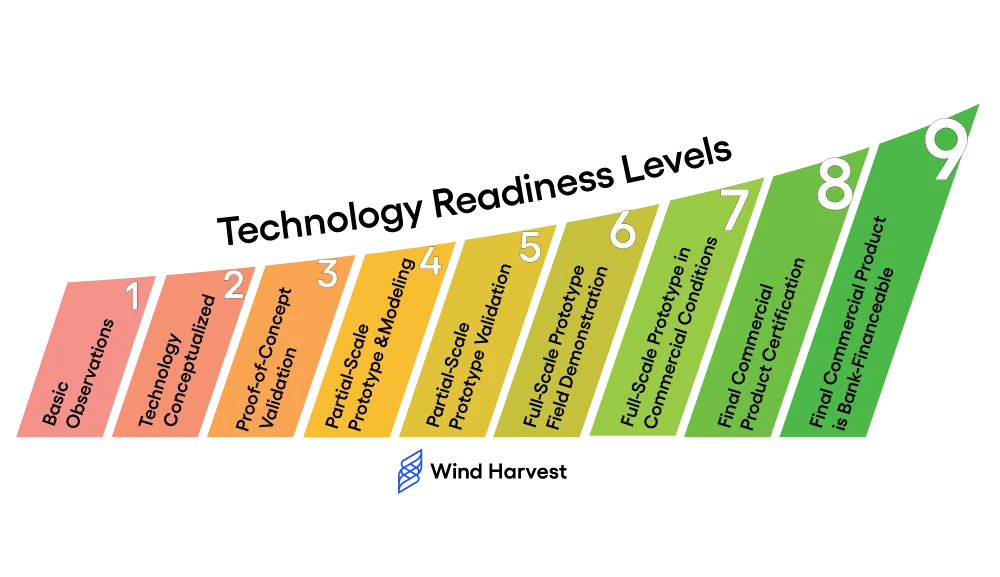
You don’t need to be an AI wizard. But your team should understand how AI for digital marketing fits into your existing tech stack.
Evaluate:
-
Do you have integration know-how?
-
Is your system secure and scalable?
-
Are your tools AI-compatible?
3. Process Readiness
Even the smartest AI agent can’t succeed if your processes are fuzzy. AI for digital marketing thrives on structure.
Check:
-
Are your workflows clearly defined?
-
Are KPIs documented and trackable?
-
Do you have fast and flexible approval flows?
4. Cultural Readiness
This is more than tech—it’s transformation. Success with AI for digital marketing depends on team mindset.
Reflect:
-
Is your team open to automation?
-
Are leaders ready to champion the shift?
-
Are you ready to blend human creativity with machine intelligence?
Start Small, Win Big
Not every task needs automation. Choose the right entry points for AI for digital marketing—places where it can immediately shine.
Best areas to start:
-
Email campaign optimization: AI can personalize and A/B test like a pro.
-
Paid ad management: Automate bidding and keyword optimization.
-
Social media scheduling: Post at peak times and track engagement.
-
Cross-channel budget allocation: Allocate spend where it matters most.
-
Content performance analysis: Understand what’s working—instantly.
Grow in Phases: Your AI Journey
Think of AI for digital marketing like nurturing a plant. Growth takes time—but the results are powerful.
Phase 1: Augmentation (1–3 months)
AI gives recommendations. You still make the final call. Perfect for testing and learning.
Phase 2: Supervised Automation (3–6 months)
AI starts taking action—under your watch. It handles routine tasks with regular reviews.
Phase 3: Strategic Partner (6+ months)
Now, AI for digital marketing runs complex campaigns across channels, giving you space to be more creative and strategic. You focus on vision—AI handles the volume.
Pro tip: Even as AI grows, remember—AI enhances human work, not replaces it.
Humans + AI: The Perfect Marketing Team

P&G found something interesting—when people worked with AI, they felt more motivated and less stressed. That’s because AI for digital marketing handles the boring stuff, so humans can focus on creativity, ideas, and smart planning.
To make the switch easier:
-
Show your team how to work alongside AI tools.
-
Celebrate small successes—it builds confidence.
-
Keep communication open so you can keep improving.
Easy Tools to Get Started
Want to see how AI for digital marketing can help? Start with these simple, no-code tools:
-
Make – Drag-and-drop tool to automate your marketing tasks.
-
n8n – Custom workflows that fit your needs.
-
Zapier – Easy connections to over 5,000 apps, no tech skills needed.
Final Thought
The future isn’t human or machine—it’s human with machine. The businesses winning today aren’t those who fear AI—they’re the ones embracing it as a partner.
So if you’re serious about scaling smarter, moving faster, and standing out in the digital noise—it’s time to get serious about AI for digital marketing.
Agent platforms

Smart Tools That Power AI for Digital Marketing Success
As a digital marketer, you’re always looking for smarter ways to work—tools that not only save time but actually think with you. That’s where modern AI platforms come in. Today’s AI agents aren’t just assistants—they’re teammates that help drive campaigns, automate decisions, and scale success.
The Creative Power of AI for Digital Marketing: A Poetic Take on Smart Tools
In today’s digital world, where everything scrolls, swipes, and clicks in seconds, marketers are constantly under pressure to be quicker, smarter, and more impactful. This is where AI for digital marketing becomes more than just a buzzword—it becomes a vital ally.
Let’s explore this transformation in a poetic, relatable way.
In a world that scrolls and clicks so fast,
Marketers need tools built to last.
Enter AI with its brilliant spark,
Lighting the way, igniting the dark.
Gone are the days of guesswork and slow reaction. Today, AI agents help digital marketers automate, optimize, and personalize in real-time.
Take Phantom Buster, for example.
It’s like having a tireless assistant that scours the web for leads, manages your outreach, and works while you sleep.
Phantom Buster scouts leads like a pro,
On social waves where prospects flow.
It automates outreach, saves the grind—
AI for digital marketing that’s truly aligned.
Need content that connects? That’s where Jasper steps in.
This AI writing assistant is a dream for digital marketers—helping you write social captions, ad copy, email campaigns, and full blogs with creative flair.
Jasper writes with flair and might,
Crafting content morning to night.
From catchy posts to blogs so wise,
It turns brief thoughts into viral highs.
And for stunning ad designs? Say hello to AdCreative.ai.
It generates bold, high-performing creatives that are optimized with real-time data—no design team required.
AdCreative.ai paints the screen,
Designs that pop, bold and clean.
Tested, optimized, ready to fly,
Ad power that lifts your ROI.
So what should you look for in these tools?
So when you choose your tech with care,
Ask: can it think, learn, and share?
With tools like these, you stand apart—
AI for digital marketing is your creative heart
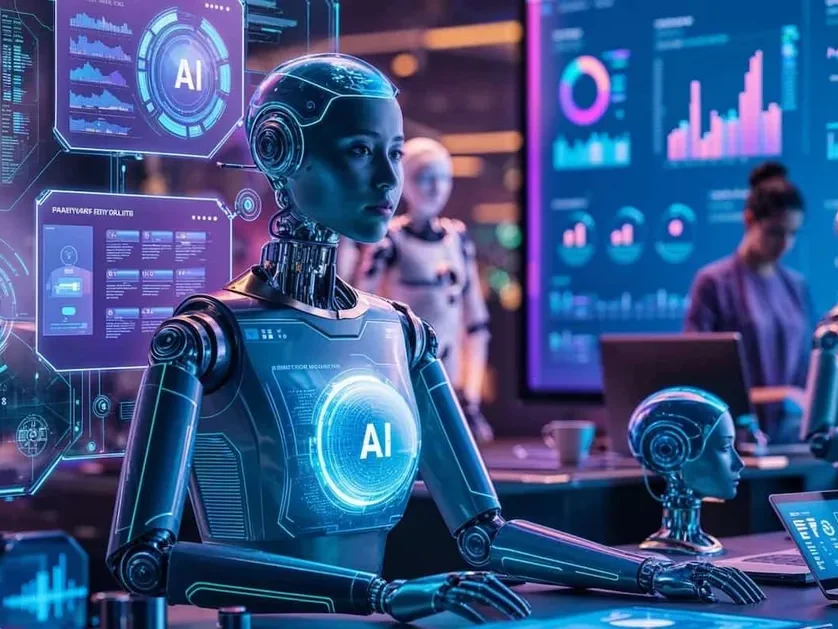
As a digital marketer, embracing AI is not about replacing creativity—it’s about amplifying it. These tools free up your time to focus on strategy, relationships, and building a brand voice that truly connects.
AI for digital marketing is no longer optional—it’s your edge in a competitive, fast-moving digital world.
conclusion: The competitive imperative
In the ever-evolving digital world, staying competitive means adapting fast. The conclusion of your blog emphasizes that using AI for digital marketing is no longer just an option—it’s a strategic must.
By integrating AI agents into your marketing efforts, you gain speed, precision, and scalability. These tools help brands respond to customer needs in real-time, manage massive data effortlessly, and create highly personalized experiences. Rather than simply automating tasks, AI for digital marketing enhances every stage of the customer journey.
This conclusion drives home the core message: the brands that embrace AI now will lead tomorrow. The real challenge isn’t whether to use AI—but how quickly you can make it a productive part of your strategy.


